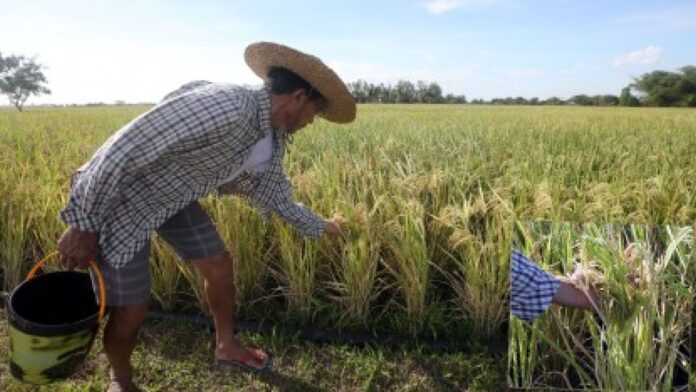The Department of Agriculture (DA) is looking into a “Masagana 150” program that will target to produce 150 cavans of rice harvest per hectare, Undersecretary Kristine Evangelista has said.
President Ferdinand “Bongbong” Marcos Jr.’s father and namesake, the late president Ferdinand Marcos Sr., introduced Masagana 99 in the 1970s to prevent a nationwide rice shortage.
The program was designed to increase rice production by giving farmers high-yielding rice varieties, with the goal of promoting the country’s rice self-sufficiency by raising the average palay crop yield from 40 cavans per hectare to 99 cavans per hectare.
The Masagana 150 program, Evangelista said, would employ new technology in helping the farmers increase their yield.
“It’s anchored in increasing the yield based on the tech we can avail of, and the tech we have but the idea is to reach that much as far as cavans is concerned. We’re looking at how and when this can be implemented,” she said in an interview on ANC on Wednesday.
“We plant in October, we harvest next year. To manage expectations, it’s not going to be harvested this year. If Masagana 150 will be implemented, we’re looking at it to bring down the price of rice and helping our farmers come up with better yield.”
Evangelista said currently, the department is exploring all possibilities to be able to push through with the program.
More farmlands
The government is also looking into developing more agricultural land, even in urban areas, she said, adding that the country’s local supply of rice is at 12.37 million metric tons and imports about 2.36 million metric tons.
“There’s a piece of land here in Quezon City where people are farming there already. We’re bringing in younger farmers because they are innovative and adjust easily,” Evangelista said. “We’re looking at state universities. We’re looking at how to help them have a good yield so we can also supply even restaurants here in NCR (National Capital Region). What we can do here in NCR can be replicated in metro Davao.”
Marcos was sworn into office at a time when the country faces the coronavirus disease 2019 (Covid-19) pandemic, the effects of the Russia-Ukraine conflict on local employment, an economic slowdown, the shooting prices of petroleum products and basic commodities, and issues on the country’s food sufficiency, among others.
During his inauguration, Marcos vowed to focus on making the country’s food sufficient by rebuilding a robust agriculture sector, as he aspires to make the price of rice affordable to ordinary Filipinos.
Soon after, he announced that he would temporarily lead the country’s agriculture department, prioritizing the urgent need to address the challenges in the sector and boost production, thus, preventing food shortages and price increases.
“From the very beginning, I always said that agriculture was going to be a very critical and foundational part of our economic transformation,” Marcos said in one of his earlier news conferences.
Earlier pronouncements by the Department of Agrarian Reform (DAR) stated that this is doable through a mega farms project with the concept of consolidating small and individual farm lots into mega farms for rice production.
Agri groups
The Samahang Industriya ng Agrikultura (SINAG) called the proposed Masagana 150 a “nice program”, saying they are awaiting details on how it would be implemented.
SINAG president Rosendo So said he had already discussed this with the President.
“He also called me that he’s looking for the seed to increase the production. That’s good. Second, he said inputs (are) so high, farmers will use little fertilizer. I think he plans to have the G2G (government-to-government) with other countries,” So said.
For Marcos’ first State of the Nation Address, he said he expects him to denounce and eliminate “agri smuggling”.
So noted that this is the biggest problem being faced by the sector as smuggled products do not have tariffs and kill the local industry.
In his recent meetings with DA officials, Marcos instructed the department to anchor their existing programs, activities, and projects to the present situation in the agricultural sector.
He also highlighted his intent to decrease expenditures on subsidizing raw products, such as fertilizers, and maximize government funds in addressing other concerns of local farmers. (PNA)


